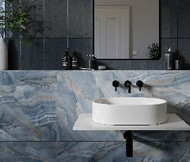How to Choose the Best Bathroom Tiles and Wall Panels for Your Space
17th Dec 2024

When you're designing your dream bathroom, choosing the right tiles or wall panels is key to creating a cohesive look that works with your furniture. These fixtures are more than just a design choice; they offer a practical way to protect your plasterboard from water damage while adding a pop of colour or texture to your space.
However, with so many options on the market, figuring out what suits your home can be overwhelming.
That's why we've pulled together this comprehensive guide, with insights from Brian Toward, Chief Executive Officer (CEO) here at Wholesale Domestic, so you can create a bathroom that looks and feels just right.
Contents
- What types of bathroom tiles are there?
- What types of wall panels are there?
- How to choose bathroom tiles
- How to choose bathroom wall panels
- Frequently asked questions
- The best bathroom tiles for your home
- The best bathroom wall panels for your home
What types of bathroom tiles are there?
Bathroom tiles come in a wide range of materials and styles, making it easy to find an option that suits your taste.
Let's take a look at some of the most common tile materials:
Porcelain tiles
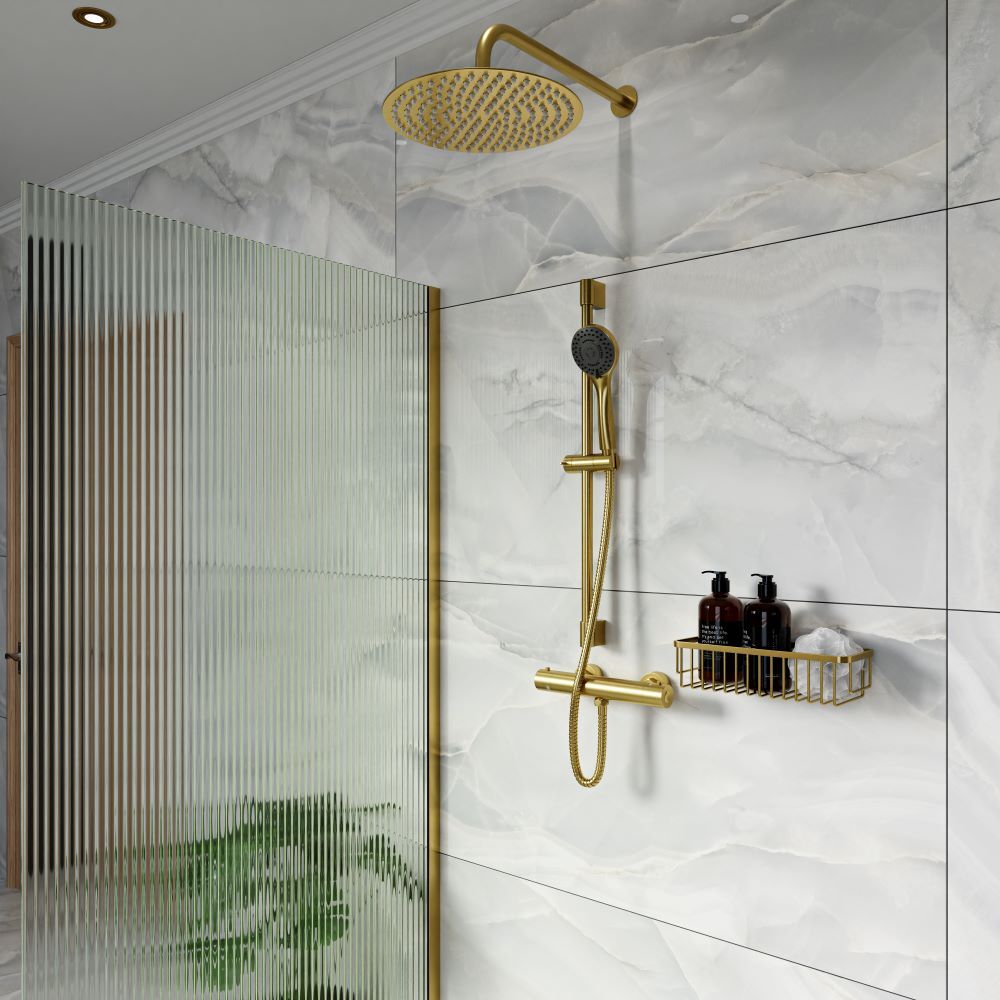
Porcelain tiles are often used in bathrooms because they're dense, hard-wearing and known for being water and stain-resistant. Whether you're installing wall tiles or retiling the floor, this material is great for spaces with high moisture levels – including bathrooms – as the tiles are less likely to warp or crack over time.
They’re also highly versatile and available in styles ranging from sleek modern finishes to natural stone looks.
Ceramic tiles
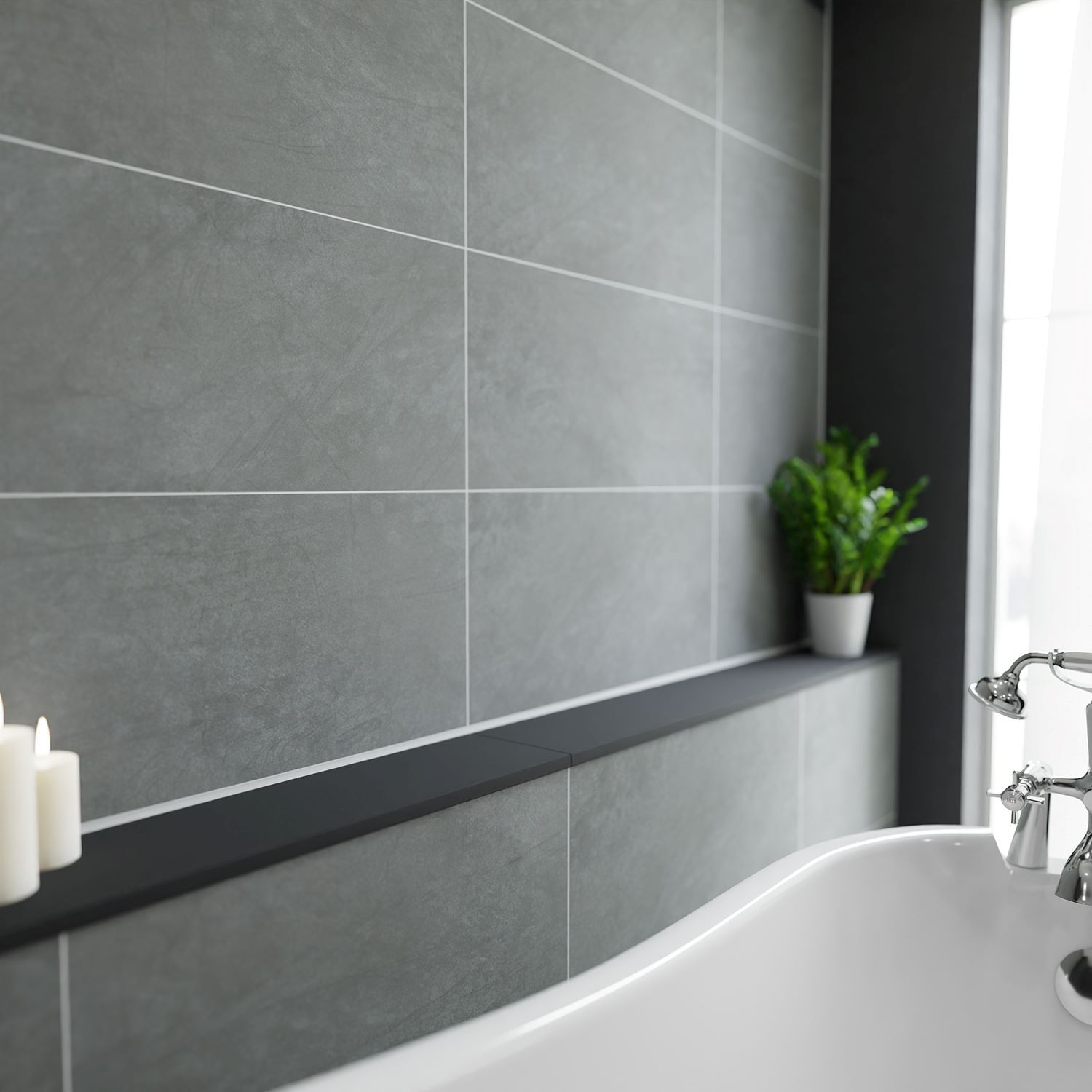
Ceramic tiles are a versatile and more budget-friendly choice for bathroom walls and floors. Made using natural clay that's been finished with a durable, water-repelling glaze, ceramic tiles are known for their affordability and easy installation process.
These tiles are usually square-shaped, although you may also find rectangular or even hexagonal options.
Ceramic wall tiles add a stylish, protective layer to bathroom walls, and floor tiles made of this material offer a lower-cost option for covering large areas.
Plus, they're low-maintenance – like porcelain tiles, they’re very resistant to stains and scratches, making them an excellent choice for busy households.
Available in various colours and finishes, ceramic tiles allow you to achieve almost any design look, whether you're aiming for a sleek, contemporary bathroom or a more traditional style.
Vinyl tiles
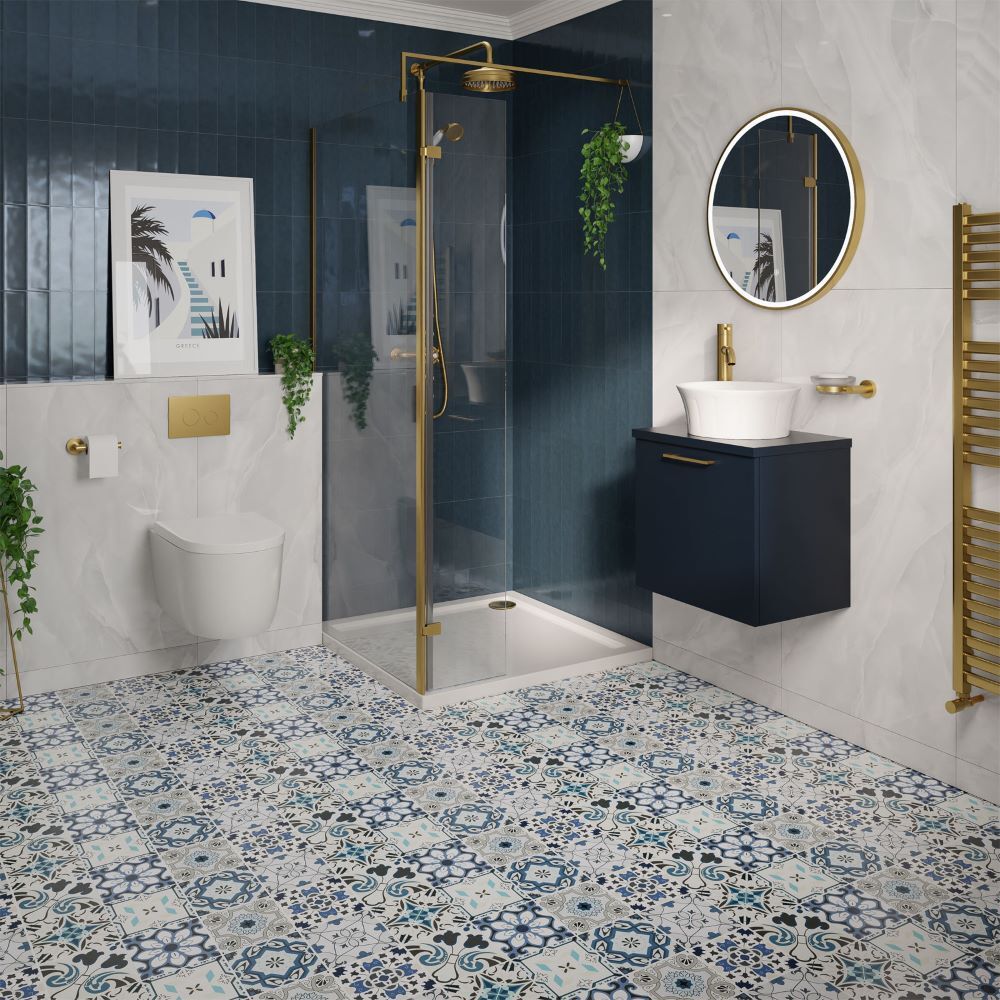
Vinyl tiles are a low-cost option known for being easy to install. This makes them perfect for anyone new to DIY renovations or in a rush to complete their flooring project.
This water-resistant material is designed to handle high-traffic areas like bathrooms and kitchens with ease.
While it has a slightly lower level of durability compared to ceramic or porcelain tiles, vinyl’s scratch-resistant surface makes it an excellent choice for busy family homes with kids or pets. Plus, they’re incredibly easy to keep clean; simply mop or wipe away any dirt.
Vinyl tiles can mimic various materials without the time-consuming maintenance required by the originals. If you love the look of natural wood, vinyl is a great, waterproof alternative. Or, if you’re looking for something bold to make a statement with your flooring, vinyl is also known for its vibrant patterns.
Mosaic tiles
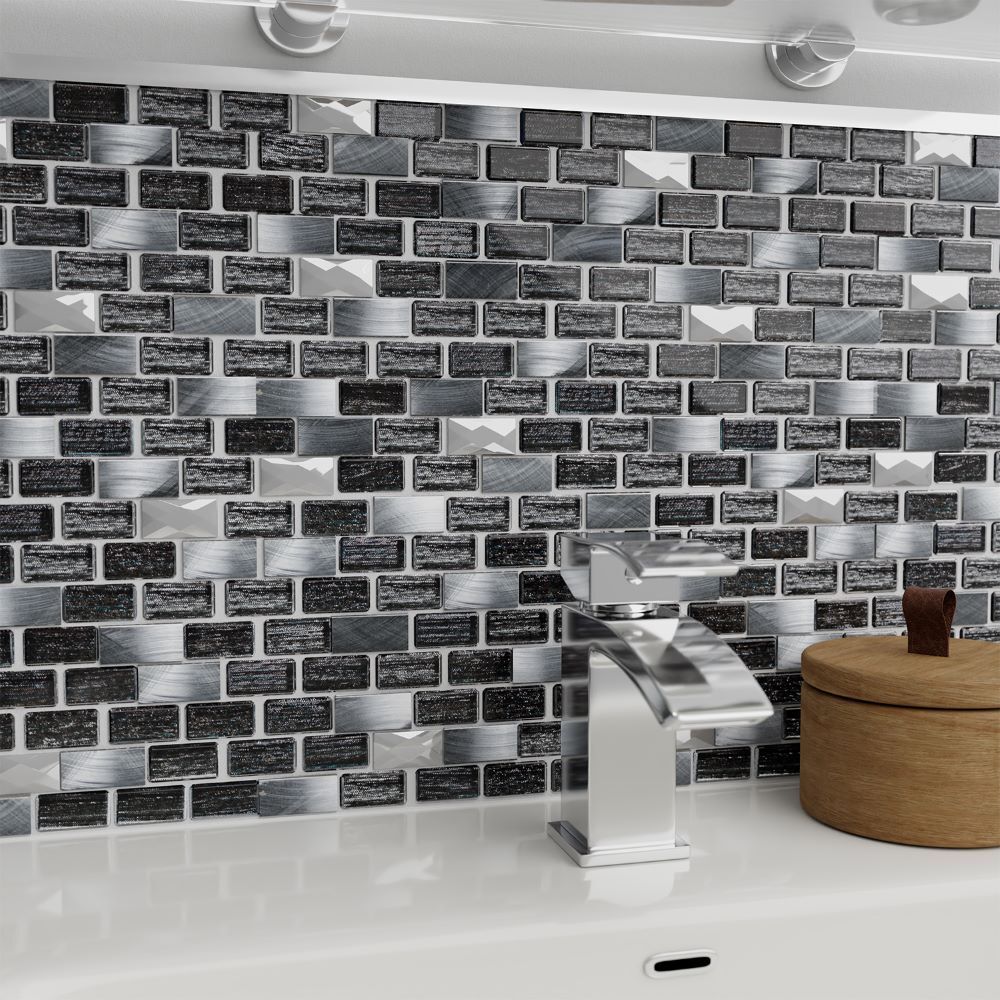
Mosaic tiles are perfect for adding an eye-catching feature wall to your interior design. Made up of smaller tiles that have been grouped to form larger pieces for easy installation, mosaic wall tiles can bring texture and colour to your space.
These tiles can be made of several materials, including glass, porcelain, natural stone, and mixed materials, for an authentic mosaic look. This means there’s a wide range of colours and shapes to choose from, perfect for awkward spaces and matching to specific colour schemes.
Many of the tiled options have more rugged edges that need to be lined up carefully for a flush design, making the installation slightly more difficult. However, some styles come as sheets – large sections where individual tiles are pre-attached to a backing. This design simplifies and speeds up the installation process by allowing you to place multiple tiles at once rather than installing each one individually.
What types of wall panels are there?
If you're looking for an alternative to tiles, wall panels can be a fantastic choice, especially if you're covering large areas or working with a tight budget. These moisture-resistant panels are usually made of PVC and snap together using a tongue-and-groove interlocking system without needing grout, making them easier to maintain between deep cleans.
They’re a popular choice for wet rooms, as their design makes it quick and easy to protect large areas from water damage.
Let's take a look at some of the most common types of wall panels for your bathroom:
Plastic wall panels
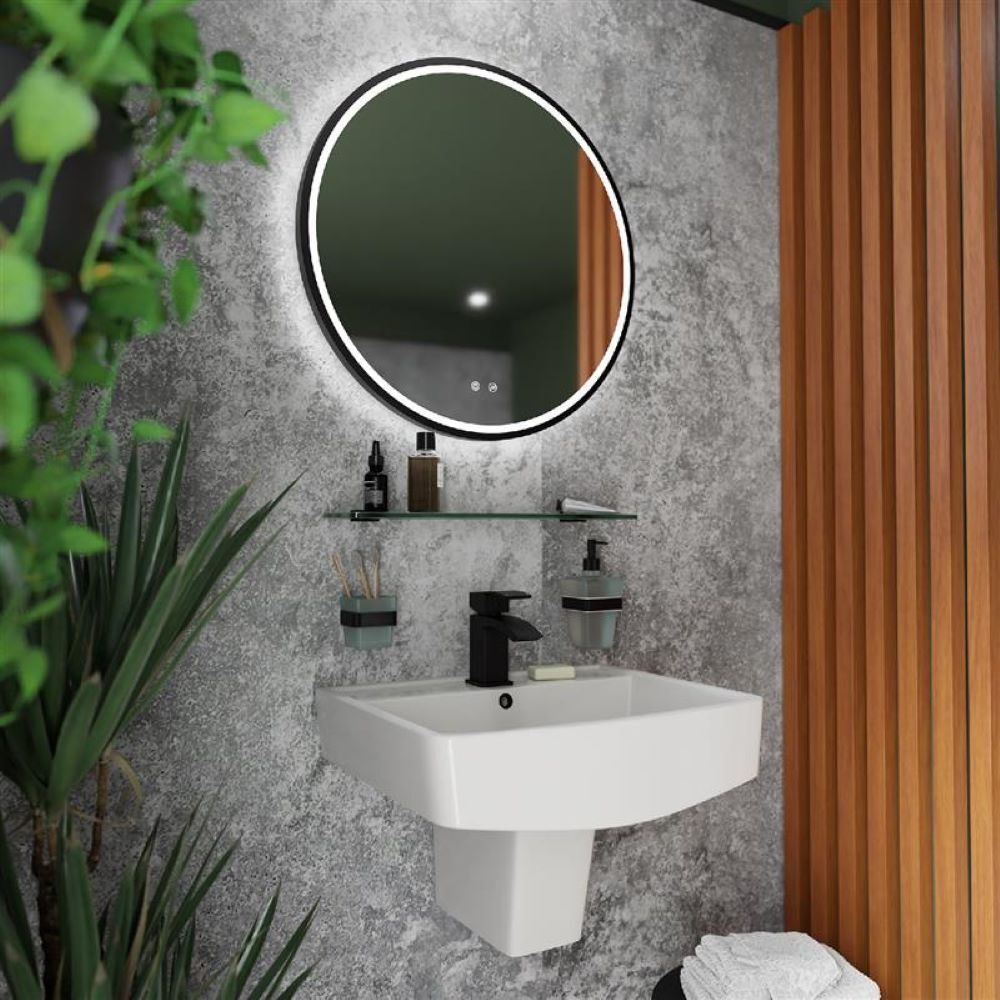
Plastic wall panels (also known as PVC wall panels) are one of the most affordable options, making them a great choice if you're renovating on a budget.
These panels are lightweight and easy to install, providing a waterproof surface that's perfect for protecting against splashes in the bathroom. Made from durable plastics, they're designed to withstand moisture without warping or cracking. Plus, their smooth, wipe-clean surfaces make it simple to keep your plastic wall panels fresh.
With a range of colours and finishes, plastic wall panels can add style without the expense or upkeep of tiles.
MDF wall panels
MDF (Medium Density Fibreboard) wall panels offer a more solid and premium feel than other panel types. They’re made from wood fibres compressed under high pressure, providing better durability and insulation. This makes them a great option if you're looking for wall panels that keep your bathroom warm throughout the year.
Because of their density, MDF panels are also highly resistant to impact, which can be a plus in family bathrooms or high-traffic areas.
Because of their wooden construction, these panels are usually treated with a waterproof coating to protect them from moisture. So, there's no need to worry about whether they're suitable for wet areas like around the sink or bathtub.
Wood-effect wall panels
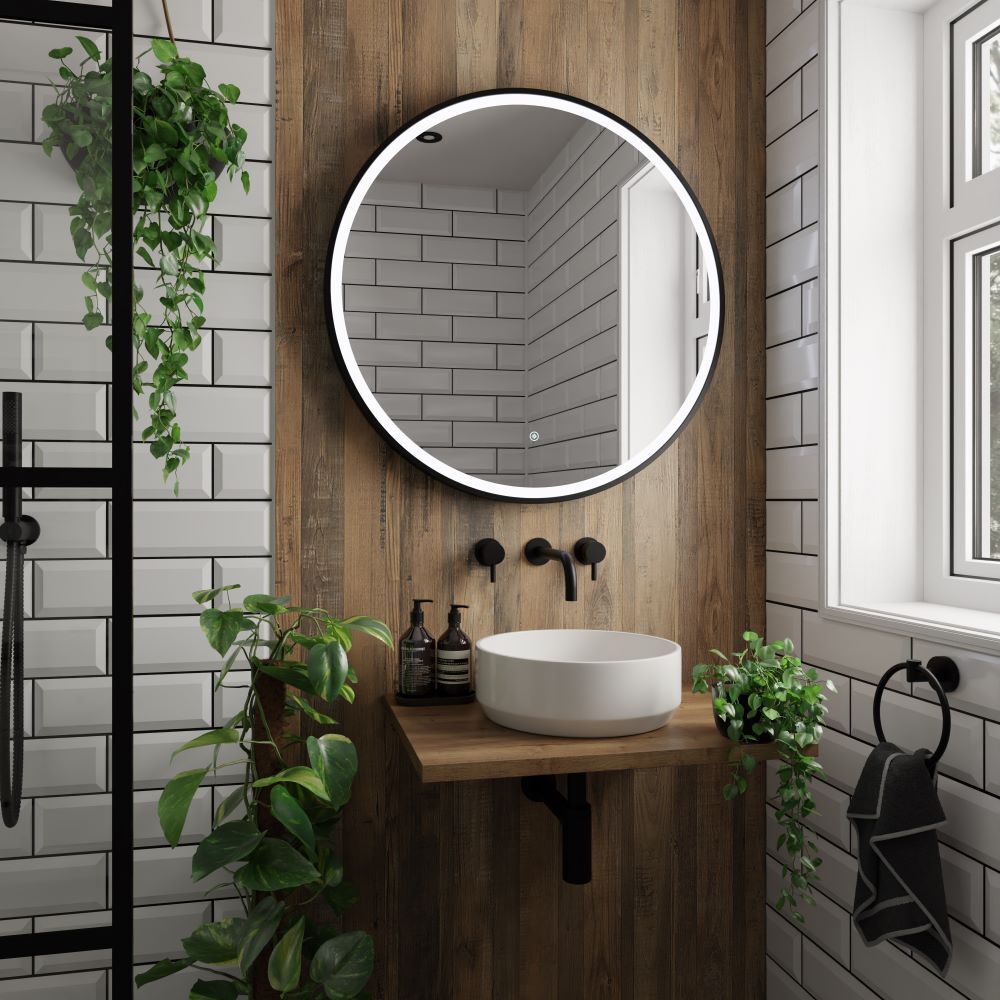
Wood-effect wall panels are the perfect way to bring warmth and natural texture into your bathroom without the challenges of using real wood in a wet environment. These panels offer the look of wood grain, adding a cosy feel that works well in traditional and modern bathroom styles.
However, unlike real wood panels, which can be prone to mould, mildew, and warping due to humidity and heat, wood-effect panels are made from waterproof materials such as polystyrene or acrylic. They're a great choice if you're trying to create a spa-like bathroom but don't have the time to treat real wood for water damage regularly.
How to choose bathroom tiles
Finding the right tiles for your bathroom can make all the difference in achieving a cohesive and stylish look, but there are a few things to consider to ensure they also meet your practical needs.
Let's dive into some key factors to consider when choosing your new tiles:
Colour and pattern
Bathroom tiles are available in a vast range of colours and patterns, helping you create the perfect look for your space. Whether you're going for classic black tiles or a luxurious marble-effect, the choice of colour and pattern can make a big impact.
For a more industrial look, concrete-effect tiles are a great way to bring the impression of porous textures into your bathroom while remaining easy to clean and maintain. Or, choose patterned tiles to add character.
Brian suggests: “When choosing tiles, think about your bathroom's overall style and colour scheme. Your tiles should work well with your existing bathroom furniture, so the final look feels cohesive and complimentary.”
“A neutral colour palette often creates a timeless look that's easy to match to a wider range of basin units and toilet designs, while patterned or coloured tiles are perfect for creating an eye-catching focal point.”
Size
Bathroom tiles come in a wide range of sizes, from small mosaic pieces at 150mm tall to large-format tiles up to 3050mm in height, so it's crucial to consider the area you're covering and your budget.
Brian explains: "If you're looking to save on a full bathroom renovation, larger tiles can help keep costs down since you'll need fewer of them. Plus, the installation is usually quicker."
"But smaller tiles are great for adding a detailed, bespoke look, especially for features like splashbacks or accent walls. Just keep in mind that it can get pricey when covering large areas."
He adds, “This is where tile sheets can be a lifesaver, saving you time and money on large-scale installations by fitting pre-arranged sections of tile instead of manually adhering each tile individually.”
Water resistance
Moisture is inevitable in a bathroom, so choosing tiles with good water resistance is essential. This guarantees that your tiles won't warp, crack, or lose their finish over time, even in areas with a lot of humidity.
Tiles with low porosity are best for areas with high moisture, especially if your bathroom has poor ventilation and tends to hold onto dampness for longer.
"Not all tiles are equally water-resistant, so it's important to think about where they'll be placed," Brian advises. "For example, porcelain tiles are highly resistant to water, making them ideal for showers and splash zones around sinks."
"Natural stone tiles, like terracotta, can bring a luxurious, rustic look to your bathroom, but they tend to have higher porosity. They're better suited for lower-moisture areas, like feature walls or decorative borders. That said, they can still absorb moisture without proper sealing and maintenance, leading to staining or damage over time."
"If your bathroom retains a lot of moisture, investing in lower-porosity tiles can save you trouble in the long run."
Slip resistance
When choosing new tiles for your floor, it's essential to consider their level of slip resistance, especially for spaces prone to moisture like kitchens and bathrooms.
Brian explains: "Tiles are typically rated on a slip-resistance scale ranging from R1 to R13, with R10 and above being considered safe for wet environments, like shower areas and floors that tend to get slippery."
"Opting for tiles with a lower slip-resistance rating could increase the risk of accidents, so it's important to choose a rating that matches the specific needs of the room."
At Wholesale Domestic, you'll find the slip-resistance rating clearly listed for each of our floor tiles, helping you make an informed and safe choice.
How to choose bathroom wall panels
Like tiles, wall panels come in a range of options, each with its own benefits and disadvantages. When choosing new wall panels, the right type for your specific bathroom can depend on your style preference, budget, and the level of durability you're looking for.
Let's look at the key factors to consider when selecting bathroom wall panels:
Panel depth
Bathroom wall panels are available in a range of depths, which can influence the overall aesthetic of your bathroom. It's important to consider that not all panel depths may perfectly fit the space you've planned to install them.
Options range from 5mm and 6mm panels for an almost seamless finish that just slightly extends from the wall to 10mm options for a more pronounced effect.
Brian explains: "The panel depth you choose will impact how flush it sits against the wall and how thick the material is, so it's worth thinking about – especially if you're working around a lot of permanent fixtures, as you'll need to cut through the panel during the installation."
Materials
The material you choose for your wall panels is vital, as this will affect their appearance, durability, and water resistance. In a high-moisture environment, selecting materials that can withstand humidity without warping or developing mould is essential.
Brian advises: “Certain materials are better suited for bathrooms due to their moisture resistance. PVC is a top choice for areas exposed to water, as it won't absorb moisture or warp over time, making it ideal for shower enclosures and wet room walls. In contrast, MDF panels must be sealed properly to avoid water damage.”
Colour and design
Wall panels come in a variety of colours and designs, allowing you to customise your bathroom walls however you'd like. From single-colour modern panels to texture-illusion options like faux wood or faux marble finishes, the design can transform the feel of your space.
However, like any aspect of your bathroom, choosing the right colour is essential for a cohesive look that complements your other furnishings.
"When picking out wall panels, consider how they'll work with your decor,” Brian recommends. “A plain white or black panel might be the perfect backdrop if you're going for a minimalist look.”
“On the other hand, faux wood or marble designs can bring warmth or a touch of luxury to your space alongside a freestanding bath or large frameless shower enclosure."
Frequently asked questions
Can you use floor tiles on walls?
The simple answer is yes; you can often use the same tiles for both walls and floors. However, there are some exceptions.
Brian explains: "While some bathroom tiles are dual-use, it's important to check the tile's weight specifications before hanging them on the wall. Floor tiles are typically thicker and heavier than wall tiles, so not all types can be wall-mounted vertically."
"Many tiles specify in their features whether they are wall- and floor-safe, so I'd always advise checking this before buying them."
"If you want to use wall tiles for your flooring, check the weight restrictions to make sure that the tiles can bear weight directly without cracking. You'll also want to look at the slip-resistant rating to ensure safety in wet areas like the shower."
Are ceramic tiles waterproof?
Ceramic tiles have a certain level of water resistance due to their glazed surface, but they're not entirely waterproof.
While they're a good choice for areas with moderate moisture, like walls or splashbacks, they must be sealed properly to avoid water damage.
Porcelain tiles are often a better choice in high-moisture areas, like a shower enclosure or around your bath, due to their lower porosity and higher water resistance.
Are wall panels waterproof?
“No, not all wall panels are fully waterproof, as this depends on the material they're made from,” Brian warns.
“PVC and plastic panels are generally waterproof and suitable for wet areas. Other types, like MDF, may need additional treatments to resist moisture and prevent mould if you plan to use them in places where they're guaranteed to get wet often.”
How many tiles will I need?
The number of tiles you'll need depends on the size of the tiles and the dimensions of the area you're covering.
Brian explains: “To find out how many tiles will cover the area, measure the length and width of the wall or floor space and divide by the surface area of a single tile. Our handy tile calculator allows you to enter your measurements in m² and will calculate how many boxes of tiles will be required.”
“For more intricate layouts or patterns, it's a good idea to account for some extra tiles to cover cuts and possible breakages.”
Are wall panels or tiles a better option?
Both wall panels and tiles have unique advantages, and there's no clear 'better option'.
Bathroom wall tiles come in a wide variety of designs and are often more durable, but they require grout, which needs regular cleaning to prevent a buildup of soap scum and mould.
Wall panels are quicker to install, easier to maintain, and don't require grout, making them a good option if you're looking for a low-maintenance solution. However, they may offer fewer design options compared to tiles.
The best bathroom tiles for your home
Every bathroom has a unique style and requirements, so finding the right fit can be difficult. To help you decide, we've gathered a few of our favourite tiles and wall panels, with insights from Brian on why they make excellent choices.
Best all-rounder ceramic wall tiles
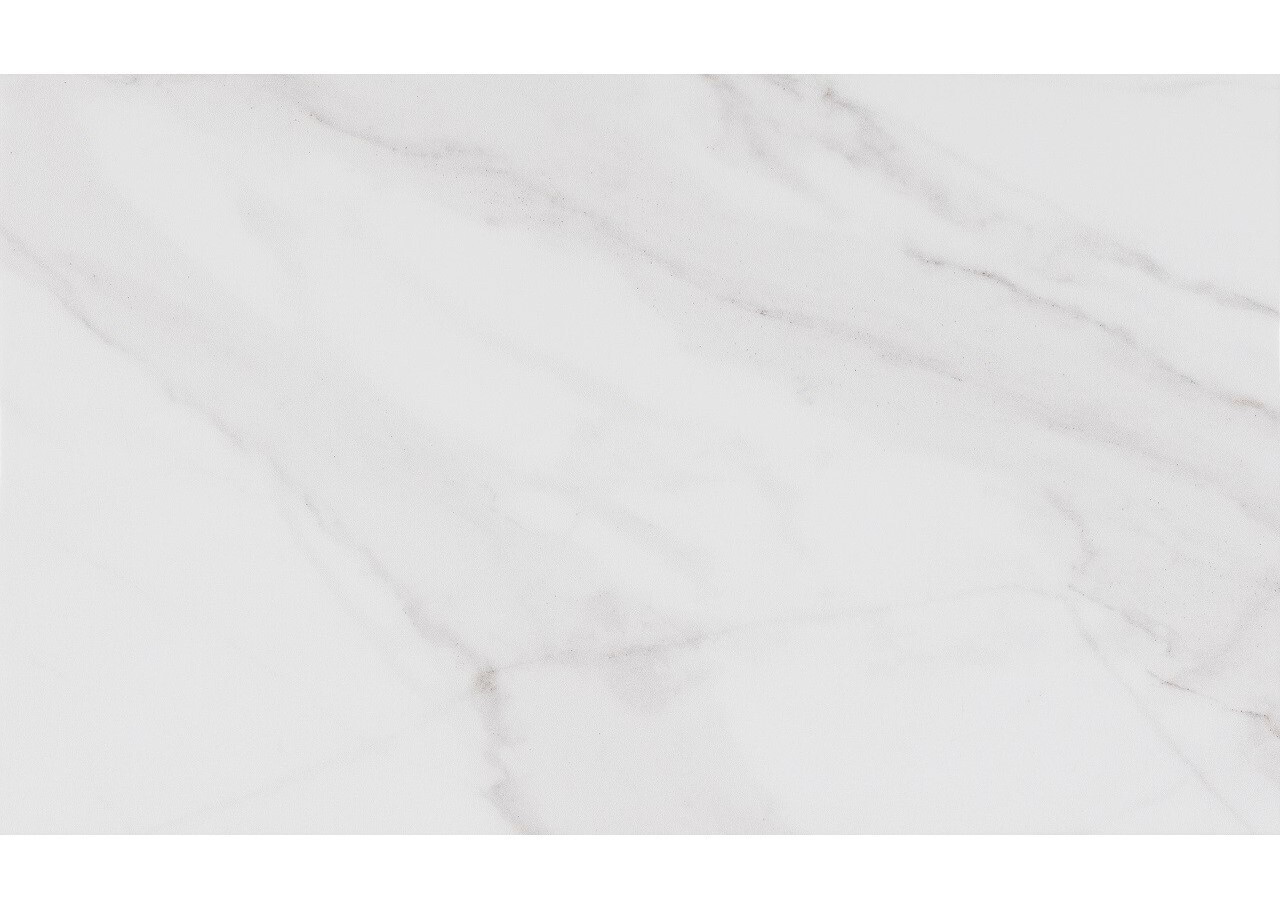
Essential Plain White 33.3cm x 55cm Ceramic Wall Tile
Brian says: "If you're after a great all-rounder, these Essential Plain White Ceramic Wall Tiles are a fantastic pick. Their classic pure-white finish with subtle light grey marbling works with so many bathroom styles. Plus, the ceramic material makes them easy to clean while protecting your walls from water damage."
"At under £40 for a box of 10, they're a budget-friendly way to get that elegant look without spending a lot."
Best budget-friendly bathroom tiles

RAK Subway White Gloss 6.5cm x 26cm Ceramic Wall Tile
Brian recommends: "For anyone looking for a cheaper bathroom tile option, the RAK White Gloss Ceramic Wall Tiles offer a sleek and modern finish without costing a fortune."
"The timeless white gloss finish reflects light beautifully, helping to make smaller bathrooms feel brighter and more open."
"This glossy surface also makes them easy to wipe down, so they're perfect for family bathrooms where bathtime can make a bit of a mess."
Best bathroom tiles for floors

Asly Black 7.5cm x 30cm Porcelain Wall and Floor Tile
“These black porcelain wall and floor tiles are a stunning option if you want to make a bold statement with your floor,” says Brian.
"The rich black glossy finish adds a touch of luxury, and it's a practical choice, too – the dark colour helps disguise everyday dirt, so you don't need to worry about constant cleaning. These tiles are also compatible with underfloor heating, which is great if you're trying to heat a cold bathroom in the colder months.”
“What I like about these tiles is their versatility. They're dual-use, so you can fit them on the wall too to create a cohesive look throughout the bathroom.”
Best tiles to make a statement

RAK Symphony Ornamental Blue Matt Porcelain Wall and Floor Tile
Brian says: "For anyone wanting to add a striking feature to their space, the RAK Symphony Ornamental Blue Matt Tile is hard to beat. The intricate blue pattern brings a touch of sophistication and acts as a real focal point in the bathroom."
"Thanks to its durable porcelain construction, it's ideal for high-moisture areas and works brilliantly in a shower to add a pop of colour and personality."
"The matt finish gives it a sleek, contemporary feel that works perfectly with modern bathrooms."
The best bathroom wall panels for your home
Best budget-friendly wall panels
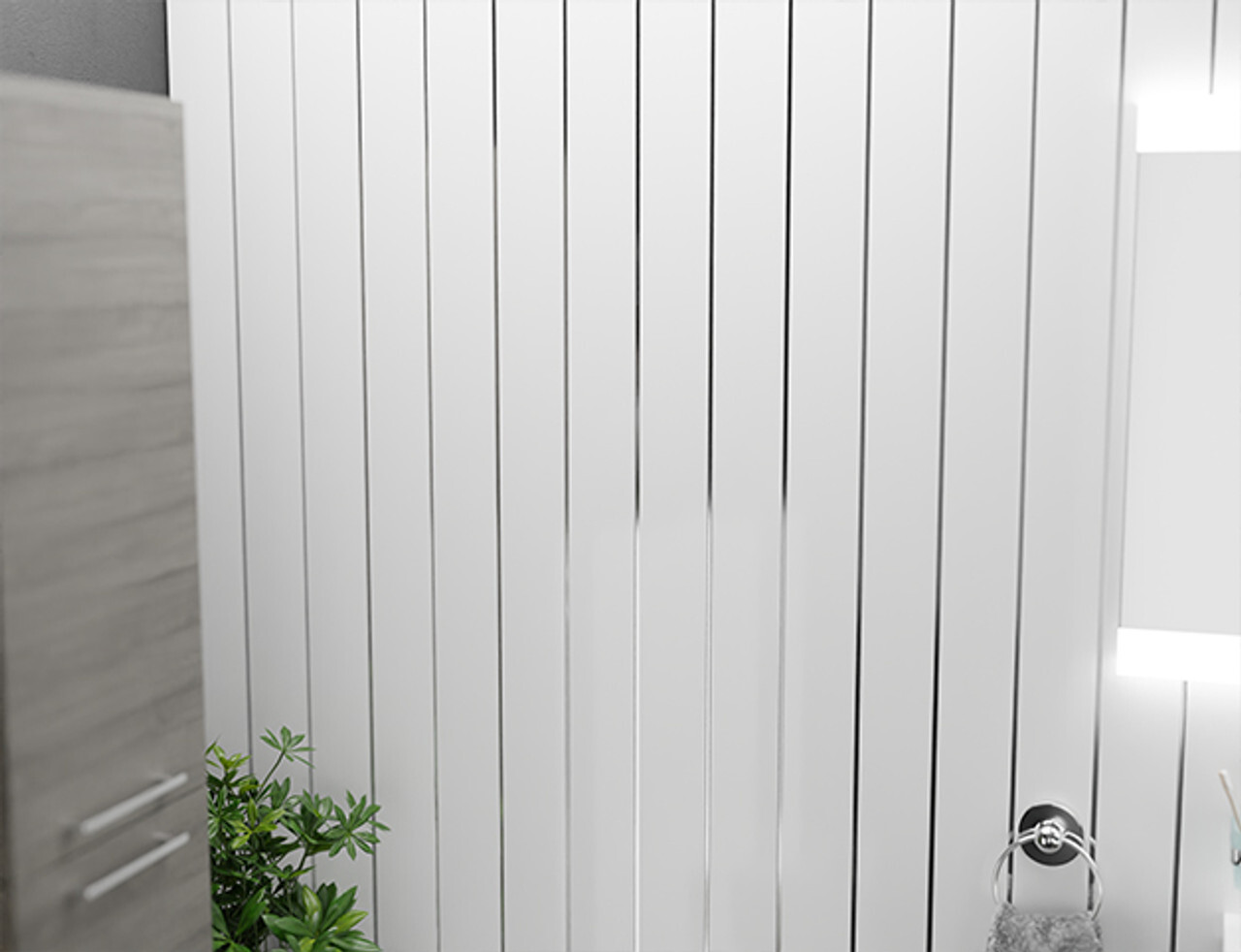
WholePanel 6mm Gloss White with Silver Strip
Brian says: “For anyone working with a budget, this Gloss White Wall Panel is an excellent choice. At just under £40 for a pack of five, it's an affordable way to create a bright, open bathroom.”
“Whether you’re new to DIY or a seasoned professional, these panels make installation a breeze – simply click them together using the unique tongue-and-groove system and apply them to the wall using panel adhesive.”
“This panel combines a fresh, white gloss finish that's easy to coordinate with a range of bathroom furniture styles. Plus, the 6mm depth means the panels sit almost flush to the wall, so you don't have to worry about them protruding or feeling bulky.”
Best wall panels for modern bathrooms
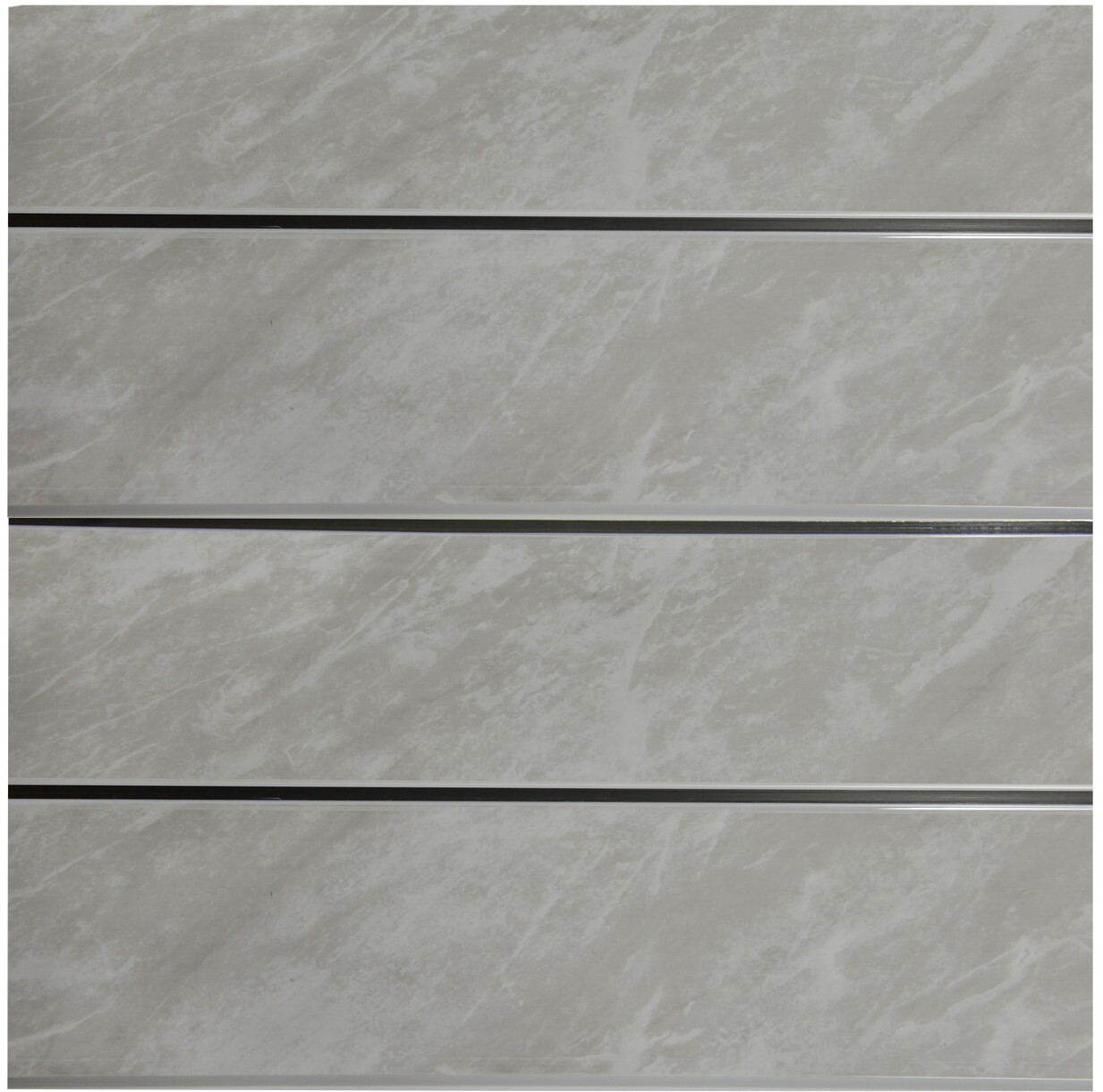
WholePanel 6mm Grey Marble with Silver Strip 200mm x 2700mm Wall/Ceiling Panels
"Grey is a popular choice for contemporary bathrooms, but these panels take it a step further with a subtle metallic touch that adds a bit of something extra," explains Brian.
"The grey faux-marble finish, paired with silver strip detailing, instantly adds a sense of luxury to any space – without the hassle of maintaining real marble."
"They're also steam-resistant, which makes them perfect for humid bathrooms, and you can even use them on the ceiling to create a fully coordinated look."
Shop tiles and wall panels at Wholesale Domestic
Now that you've explored the different options, it's time to find the perfect wall covering to finish your bathroom setup. At Wholesale Domestic, we offer a variety of wall and floor tiles to suit every style. We also have a range of wall panels for low-maintenance moisture protection.
Whether you're renovating your entire bathroom or just adding a new feature wall, we've got everything you need to create a cohesive, stylish space. For a seamless installation, shop our tile and wall covering accessories, including grout, panel adhesive, and trim. We also offer shower enclosures, bathroom furniture, and other essentials to complete the look.
Still trying to decide which product is the best fit? No need to worry; our team is always on hand to help. Contact us today for advice, or for more inspiration, visit our blog.

 FREE delivery over £500*
FREE delivery over £500* Visit our showrooms
Visit our showrooms Finance options available*
Finance options available* Apply for a Trade Account
Apply for a Trade Account